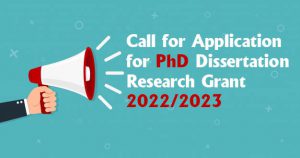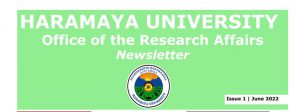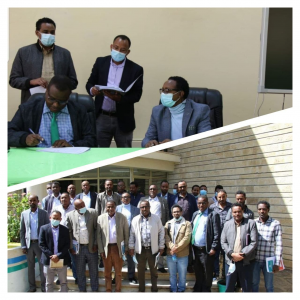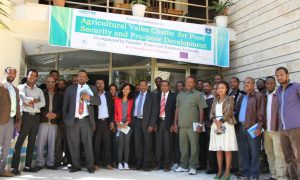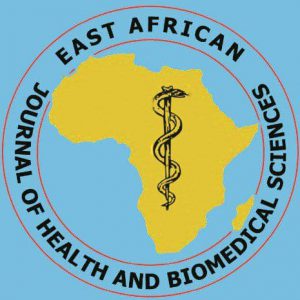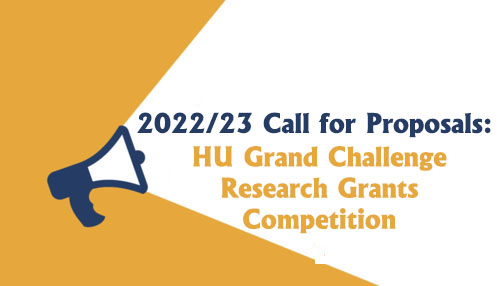
The Federal Government of Ethiopia has made research funds available to public Higher Education Institutions to enable University Staff members to do problem-solving research and produce scientific knowledge in various disciplines and enhance their careers and contribute to the socio-economic development of the country. The government has made the funds available with the intention of increasing the involvement of staff and postgraduate students in research and technology exchange with communities, which is aimed at supporting the Growth and Transformation Plan of the country.
In line with this, Haramaya University (HU) has been offering research funds for its staff members to engage in problem-solving and innovative research in a thematic research approach. The Office of Research Affairs has been funding research projects under five research categories: HU Regular Research Grant (HURG), HU Innovation Fund (HUIF), HU Knowledge Transfer (HUKT), HU Women Grant (HUWG), and HU Special Support (HUSS).
In the 2021/22 fiscal year, the office initiated a new scheme known HU Grand Challenge Research Grant (HUGG) aimed to fund research undertaking that tackles some of the biggest/grand challenges facing society today (i.e. most pressing local and/or national societal problem) with more impactful results. The grant scheme promotes multi/transdisciplinary research with relatively large budgets and professional networking involving senior researchers alongside early career researchers or recruiting graduate students.
Rationale
The grant was designed to address problems with the other grant-awarding system, which was often complained about by many as not producing impactful results up to expectations, as most of the projects awarded are small-scale with limited funding within in the short-term, leading to a high-risk of incompleteness. It is also believed that this reduced the participation of experienced researchers in the HU research grant competition. In addition, the research projects are not crossing traditional boundaries between fields and disciplines that do not guarantee interconnectedness. Although the University set forth its research priorities under six thematic areas to integrate research endeavours for synergized impacts on societal development and to enhance the quality of education, the approach of conducting research and extension has still remained partly piecemeal.
Objective of the call
The aim of Haramaya University Grand Challenge Research Grant (HUGG) is to foster multi/transdisciplinary research collaboration across all colleges and institutes at the University; to support a multi-/trans-disciplinary, rigorous, and technically sound research projects that are relevant to the most pressing societal problem (grand challenges facing society) or generate new and ground-breaking research results. Besides, it is intended to offer researchers the advantage of studying the problems in-depth for knowledge and technology generation and transfer, as well as effective communication and application of reliable and relevant research outputs to produce an impact on society.
This call for project proposals will fund projects that:
- have the potential to address the most pressing local and/or national grand challenge leading to solutions with substantial .
- are innovative in nature, and generate new scientific knowledge, technologies and other discoveries, and generate high-quality publications that contribute to the University’s visibility worldwide.
- are multi-year and multi/trans-disciplinary combining competencies from different disciplines.
- have Research Group composed of senior staff and early career researchers with clearly identified roles and responsibilities. Alternatively, multi/trans-disciplinary large projects that can recruit PhD and/or MSc/MA students.
In order to be eligible for a grant:
- The principal investigator should be a senior researcher with a minimum academic rank of assistant professor (PhD holder).
- The applicants should be academic, research and technical staff members of Haramaya University to be members of the Research Groups.
- A staff member can only apply as a Principal Investigator for one research topic and two research topics as a Co-investigator per year. OR a staff member can only apply for three research topics as a Co-investigator per year. So, a single staff member’s participation in more than a total of three projects (multiple applications) shall lead to the rejection of all applications.
- The research project should directly address the priority research area identified for the 2022/23 call for proposals (Annex 01). The priority research area the project targeting should be mentioned in the concept note.
- The geographical area of implementation of the proposed project should be in the eastern part of Ethiopia, except for compelling reasons.
An applicant/s shall be excluded from the grant award procedure in the following conditions
- A staff member who is currently on study leave cannot be a member of the Research Group. However, s/he can be later recruited as a PhD and/or MSc/MA student by the research group.
- A staff member who has not yet submitted overdue previous research reports shall not be eligible. A single staff member with an overdue project in the Research Group shall result in rejection of the applications, not an exclusion of an individual from the research group. Therefore, the principal investigator should make sure that all members of the Research Group have no overdue projects. All HU grant holders with a research grant awarded BEFORE 2020/2021 are considered overdue projects and hence, not eligible to apply unless they submit their overdue project before the concept note submission deadline. Besides, grant holders of projects awarded in 2020/2021, which are expected to be completed in July 2022, are eligible only if they are able to submit a final report prior to the grant agreement if awarded.
- Inclusion of individuals of the same background without specific roles and responsibilities in the project implementation is not encouraged.
The funding under this scheme is up to four years (2 to 4 years) with costs, as required by the research project, up to a maximum of 4,000,000 ETB per project (2,000,000 to 4,000,000 ETB per project) with a maximum of 1,000, 000 ETB per year (500,000 – 1,000,000 ETB per year).
Initially, interested applicants need to submit a complete concept note for prescreening. A concept note must be submitted in accordance with the instructions in the concept note preparation template (Annex 01) via online using Research Grant Management System (http://grant.haramaya.edu/). Researchers need to create an account or log in to their existing account and apply under the HU Grand Challenge Research Grant (HUGG) category.
The deadline for submission of the Concept Note is July 20, 2022. The online Research Grant Management System closes July 20, 2022, at 10:00 pm. Applicants are strongly advised not to wait until the last day to submit their concept notes to avoid difficulties that might occur on the last day for various reasons.
Concept note submission link: http://grant.haramaya.edu.et/
Thereafter, the principal investigator whose concept note has been pre-selected shall be invited to submit a full proposal using the full proposal preparation template. The application shall be made online via the research grant management system.
Full proposal submission: http://grant.haramaya.edu.et/
The full proposal submission (upon invitation only)
Note that applications missing relevant components mentioned in the template and against eligible criteria will automatically be rejected.
Initially, a primary screening shall be an administrative process to verify whether the eligibility criteria and required formatting are met, and eligible concept notes shall be evaluated independently by experts and scored against the evaluation criteria. Then, a panel of experts will evaluate the concept notes based on the score and comments provided by the reviewers before recommending which applicants should be invited to submit a full proposal. Thereafter, applicants whose concept notes have been pre-selected will be invited to submit a full proposal.
The full proposal evaluation consists of a three-stage formal assessment: primary screening, secondary evaluation (expert review) and final Research Steering Committee decision. The primary screening is an administrative process to verify whether the eligibility criteria and required
formatting is met. Secondary evaluation is conducted by experts from the subject area of the submitted proposal and scored against the evaluation criteria. Finally, after peer-review evaluation, proposals are ranked and shortlisted for decision-making by the Research Steering Committee.
The RSC strictly adheres to rules of impartiality during its evaluation process, and conflict of interests provisions are in place to ensure that decision-making happens fairly and transparently. All proposals that are selected for funding will be officially announced by the Office of Research Groups and Partnerships Directorate.
